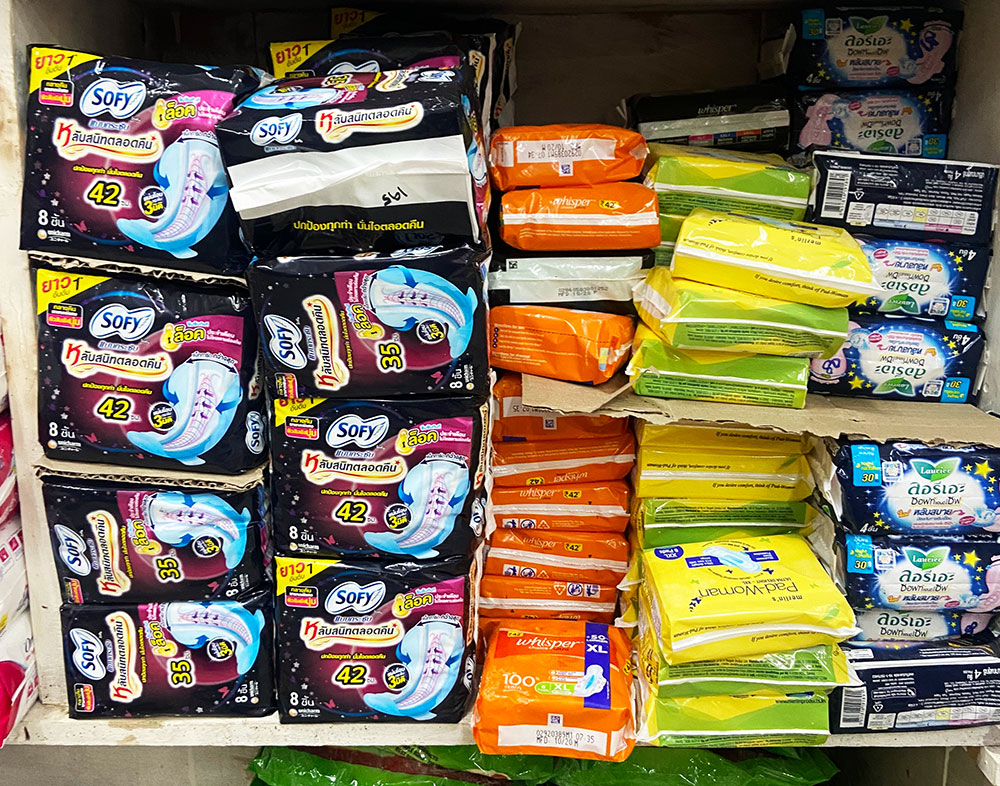No custom duty and sales tax on sanitary products
Yangchen C Rinzin
Twenty-two-year-old Chimi Dema bought a packet of sanitary pad which cost her Nu 195, the same price she paid about a few months back. However, this is not the price Chimi should be paying this time. The price should have decreased.
The government has approved the proposal to do away with the 30 percent customs duty on sanitary products and five percent sales tax to zero, according to revenue and customs officials.
An official from the revenue and custom department told Kuensel that the government has waived both custom duty and sales tax, which was implemented in July when the Custom Duty (Amendment) Act 2021 was endorsed.
“This means all sanitary pads imported from third countries should be costing lesser than what they used to because it’s now zero tax,” the official said. “However, as for the 5 percent sales tax on sanitary products imported from India, although waived, couldn’t be implemented immediately because of the Goods and Service Tax that has been deferred.”
Prime Minister Dr Lotay Tshering had issued a statement on May 28 during the Menstrual Hygiene Day where he announced that the government was planning to do away with the 30 percent import duty on sanitary products.
The prime minister stated that such a measure was significant to enhance the availability and accessibility of basic sanitary items.
The tax waiver also comes after the education ministry wrote to the foreign minister to propose for tax waiver in May.
The ministry, as the lead agency for Red Dot Bhutan, had requested the government to consider exempting taxes levied on all menstrual hygiene products, to further enhance access and affordability of sanitary products for girls, nuns and women. “Imposing a tax on a biological necessity, the Red Dot Bhutan believes, unfairly burdens girls and women.”
So, this is why Chimi should have paid at least Nu 20 to 30 less than the actual price this time.
However, many girls like Chimi shared that they did not see any price difference while in some cases, prices had increased by Nu 5-10. Many shopkeepers Kuensel talked to were not aware of tax exemption.
Some shopkeepers said that the price remained the same probably because of the inflation and increase in transportation charges during the pandemic.
Although there was no separate notification/circulars, customs officials said that since the exemption has been implemented, it was customers’ right to question spokespers on price charged.
“They must question shopkeepers and that’s the least we could do. Although it’s difficult to read the MRP for products coming from Thailand, customers can compare the price before and now.”
Affordability
Many said that the implementing agency must take the decision seriously because access to sanitary products was an issue of affordability for many girls.
Sonam Pelden, a corporate employee, said that nobody was talking about the tax exemption issue because menstrual hygiene was never considered an issue in Bhutan. “But it is time we took this as an issue and take the exemption seriously. It could only lead to substantial long-term benefits in the form of lower prices and improved access.”
A study on Menstrual Hygiene Management in 2018 revealed that 44.7 percent of respondents (1,526 schoolgirls and 202 nuns) skipped school from 1-4 days each month. The reasons were pain, discomfort, dirty toilets and lack of sanitary pad disposal options.
Close to one-quarter (21.5%) of the adolescent nuns reported that they missed classes or activities because of a lack of sanitary pads.
Deputy Chief with the Department of School and Health Nutrition, Deki Tshering, said that public advocacy on menstruation is changing attitudes for better and campaign like “Red Dot” and “Happy to Bleed” helped create awareness among girls on hygienic menstruation practices including misconceptions and taboos.
“Many schools have started giving importance and sanitary pads are distributed to remote schools where girls cannot afford it,” she said. “So, such an important decision (tax exemption) is going to help girls and nuns in many ways, especially when it comes to buying pads at affordable prices.”
Deki Tshering added that the ministry was also working to include menstrual hygiene practice into the curriculum.
Independent journalist and menstrual health advocate, Namgay Zam, said the move to not tax female sanitary products will reduce period poverty in the country and that people must realise how important the move is.
“I am glad this has happened now with the current government. It doesn’t make sense that optional things like condoms and Viagra (a pill claimed to treat erectile dysfunction) are not taxed while a mandatory requirement for females is taxed,” she said.
She added that people must remember to check if prices of sanitary products have dropped in the market. “No one experiencing periods should feel handicapped by it.”
Edited by Jigme Wangchuk


